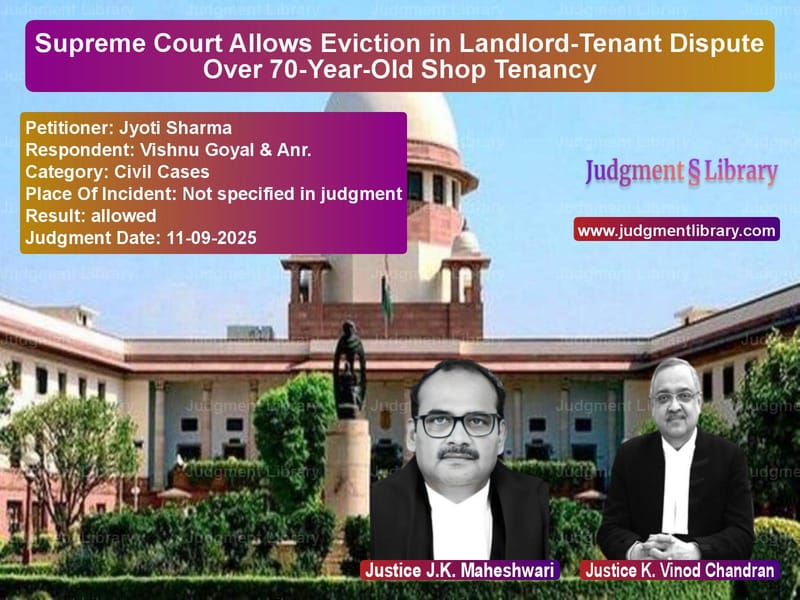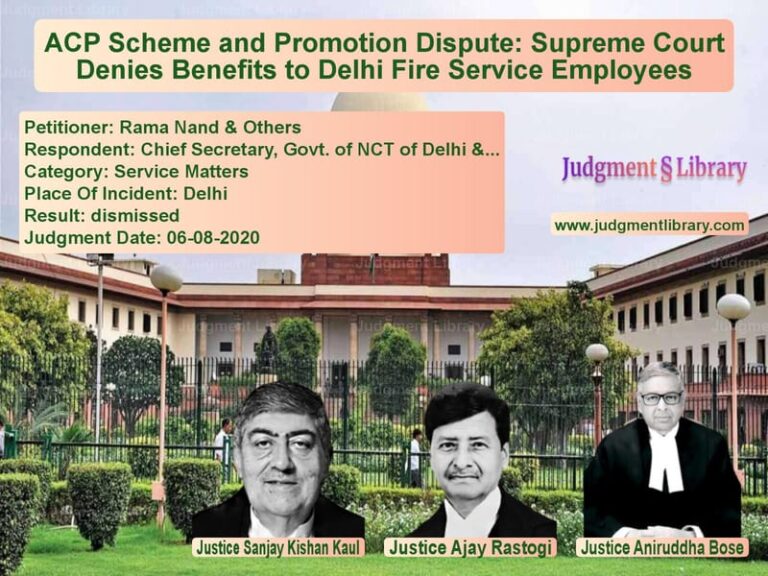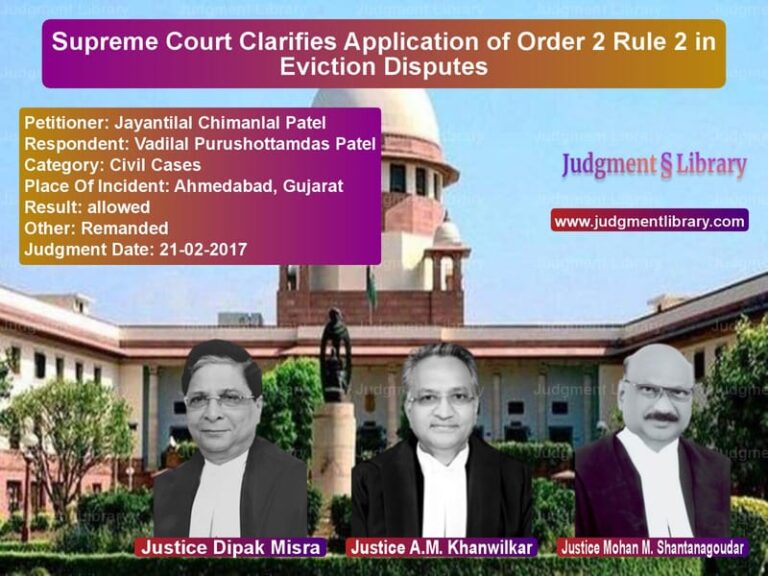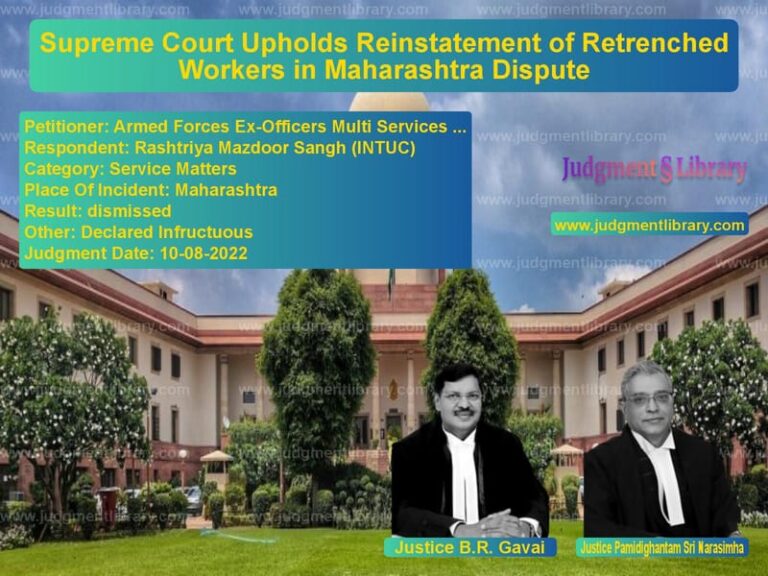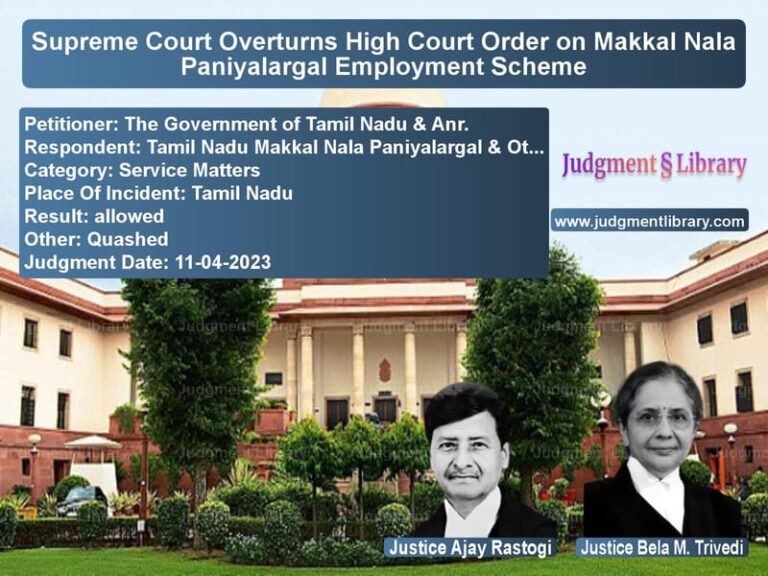Supreme Court Allows Eviction in Landlord-Tenant Dispute Over 70-Year-Old Shop Tenancy
In a significant ruling that clarifies the rights of landlords and the limitations of tenants in challenging ownership, the Supreme Court of India recently delivered a judgment in a decades-old landlord-tenant dispute. The case involved a shop room that had been rented out since 1953, with the successors of the original landlord and tenant fighting a legal battle over eviction and possession that reached the highest court of the land.
The Historical Background
The dispute centered around a shop room that was originally rented out in 1953 by Ramji Das to Kishan Lal, who ran a grocery business. After Kishan Lal’s death, his sons – the defendants in the case – continued the business and the tenancy. Ramji Das, the original landlord, passed away on August 7, 1999, but before his death, he executed a Will dated May 12, 1999, bequeathing the shop room to his daughter-in-law, Jyoti Sharma – the plaintiff in the case.
Jyoti Sharma filed a suit for recovery of rent defaulted from January 2000 and sought eviction on the ground of bona fide need. She claimed that she wanted to join her husband’s sweets and savouries business, which operated from an adjacent shop room, and expand it to the rented premises. She also asserted that the adjacent shop room where her husband conducted business had been bequeathed by her father-in-law to her children, who had also joined the family business.
The Tenant’s Challenge
The defendants, however, mounted a fierce challenge to the eviction proceedings. They disputed the very title of Ramji Das and alleged that the Will was fraudulent. They claimed that the premises actually belonged to Sua Lal, the paternal uncle of Ramji Das who died in 1984. Despite this challenge, the defendants admitted that the original rent deed was executed by Ramji Das and that he had been receiving rent from the tenants through his son – the plaintiff’s husband – which continued for a few months after his death as well.
The trial court found that after the death of the father-in-law, there was no formal attornment of tenancy, and the defendants were never informed of the bequest. The trial court expressed suspicion over the Will, based on comparison of signatures on the Will with those on rent receipts allegedly issued by Ramji Das. The court also noted that the plaintiff’s husband had received rent after Ramji Das’s death. Based on these findings, the trial court held that the plaintiff failed to prove ownership of the disputed shop and the landlord-tenant relationship, thus disentitling her from recovery of rent and eviction on grounds of bona fide need.
The Legal Journey Through Courts
The case went through multiple rounds of litigation. The first appellate court initially remanded certain issues for fresh consideration, but after the High Court set aside this order on consent for fresh disposal on all issues, the first appellate court then dismissed the appeal. This dismissal was affirmed by the High Court in second appeal, creating three concurrent findings against the plaintiff.
Before the High Court, the plaintiff attempted to produce an order dated February 9, 2018, from the Additional District Judge, which had probated the Will in Probate Case No. 8 of 2013. However, the application to produce this document under Order 41 Rule 27 of the Code of Civil Procedure was rejected. The High Court found no cause to entertain an application for production of an order that the applicant did not obtain at any time when the proceedings were pending before the trial court and the appellate court.
The Supreme Court’s Analysis
The Supreme Court, after hearing arguments from both sides, took a fundamentally different view of the case. The Court noted that the probate proceedings were initiated in 2015 after the appeal was decided on remand by order dated October 13, 2009. The probate order was issued when the matter was pending before the High Court.
The Court made several crucial observations about the trial court’s approach to the Will: “It is pertinent, as seen from the order of the trial court that the deceased Ramji Das had left behind other legal heirs also, his wife, three daughters and the wife and children of a deceased son. None of them had challenged the Will when the matter was pending before the trial court. One of the grounds taken by the trial court to suspect the Will was that though it is mentioned in the Will that the daughters of the testator were married of with their shares and even the wife and children of the deceased son had no interest in the property, nothing was kept aside for the wife. The finding of the trial court that it is not natural that a person would not keep in mind the interest of his own wife, according to us, is not a valid ground to suspect the intentions of the testator or the probity of the bequest made.”
The Court emphasized the significance of the probate order: “In any event, when an order of probate was produced, which is not mandatory, the claim of the plaintiff through a Will attains a legal sanctity which could not have been brushed aside by the High Court. It is trite that in a suit for eviction, the proof of ownership of the tenanted premises is not to be strictly looked at as in a suit for declaration of title.”
Tenant’s Right to Challenge Ownership
One of the most significant aspects of the judgment was the Court’s ruling on whether a tenant can challenge the landlord’s title. The Court firmly stated: “The dispute raised insofar as the ownership of Ramji Das cannot at all be accepted since Exhibit P-18, the relinquishment deed issued by Sua Lal as far back as in 1953, on the strength of which Ramji Das had given the disputed shop room on rent to the father of the defendants is clearly established. The tenant having come into possession of the tenanted premises by a rent deed executed by the earlier landlord, cannot turn around and challenge his ownership.”
The Court further reinforced this principle: “It is also an admitted fact that from 1953, the predecessor of the defendants and the defendants, after their father’s death had been paying rent to the said Ramji Das. The dispute regarding the title of Ramji Das could not have been raised by the tenant who had come into the premises by virtue of a deed executed by Ramji Das to whom, for more than half a century, the tenants were also paying rent.”
Attornment of Tenancy
On the issue of attornment of tenancy, the Court noted that the plaintiff’s husband had testified that he had been collecting rent after his father’s death for and on behalf of his wife, the plaintiff. The defendants also did not dispute that they had stopped paying rent from January 2000 onwards.
The Court referenced findings from the initial first appeal that had been set aside by the High Court: “It was found that the Will executed by Ramji Das was not challenged by any other heir and the relinquishment deed Exhibit P-18 was emphasized. Further, on the question of attornment, it was found that Exhibit P-9 registered notice was sent by the plaintiff to the defendants in their address and Exhibit P-10 and P-11 receipts of the notice sent were produced. The trial court disbelieved the same only on the ground that there was no acknowledgement produced. The first appellate court, had at the first instance held that since the registered notice sent in the address of the tenant was proved, the presumption is that the registered notice sent was received by the addressee. The registered notice sent clearly indicated the bequest by Will and the assertion of ownership of the tenanted shop.”
Bona Fide Need Established
Regarding the bona fide need for eviction, the Court found: “As for the bona fide need, there is no dispute as to the business carried on; of sweets and savouries, in the adjacent shop room. There is also no dispute on the sons of the plaintiff also having joined the business and the plaintiff’s intention to participate in the business, thus expanding it to the tenanted premises. The bona fide need hence stands established.”
The Supreme Court’s Final Ruling
After comprehensive analysis, the Supreme Court concluded: “On the above reasoning, we find the concurring decisions of all the three courts to have not considered the material evidence and entered into findings in a perverse manner based on mere surmises and conjectures. We set aside the orders below and decree the suit, directing the recovery of rent arrears from January 2000 till the handing over of the possession and order eviction on the grounds of default in payment of rent as also for the bona fide need.”
Showing consideration for the long period of tenancy, the Court provided some relief to the tenants: “Only considering the long period of tenancy, we enable the respondents herein to continue in possession for six months, subject to their filing an undertaking before the trial court to pay the arrears of rent within one month and give vacant possession within six months from today; which undertaking shall be filed within two weeks from the date of this judgement. If no undertaking is filed the plaintiff would be entitled to seek summary eviction of the tenants from the premises.”
This judgment reinforces important principles in landlord-tenant law, particularly that tenants cannot ordinarily challenge the title of landlords through whom they obtained possession, and that courts must examine evidence properly rather than relying on surmises and conjectures. The ruling also clarifies that in eviction suits, proof of ownership need not be as strict as in title declaration suits, and that probate of a Will provides significant legal sanctity to the bequest made therein.
Petitioner Name: Jyoti Sharma.Respondent Name: Vishnu Goyal & Anr..Judgment By: Justice J.K. Maheshwari, Justice K. Vinod Chandran.Place Of Incident: Not specified in judgment.Judgment Date: 11-09-2025.Result: allowed.
Don’t miss out on the full details! Download the complete judgment in PDF format below and gain valuable insights instantly!
Download Judgment: jyoti-sharma-vs-vishnu-goyal-&-anr.-supreme-court-of-india-judgment-dated-11-09-2025.pdf
Directly Download Judgment: Directly download this Judgment
See all petitions in Property Disputes
See all petitions in Landlord-Tenant Disputes
See all petitions in Succession and Wills
See all petitions in Judgment by J.K. Maheshwari
See all petitions in Judgment by K. Vinod Chandran
See all petitions in allowed
See all petitions in supreme court of India judgments September 2025
See all petitions in 2025 judgments
See all posts in Civil Cases Category
See all allowed petitions in Civil Cases Category
See all Dismissed petitions in Civil Cases Category
See all partially allowed petitions in Civil Cases Category

